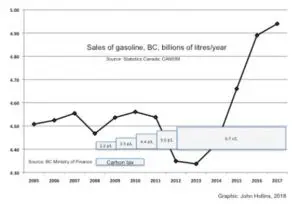Dr. John Hollins, past chair CACOR makes a response to an article by Andrew Coyne
Re: Carbon tax flawed. But it’s the best option for now, National Post, October 25
Wrong. At the level of tax proposed, it will not do anything to help Canada meet the commitment it made in Paris. Such a tax works only in a market in which price is the
dominant variable. So it’s just fine in a corporate setting where the bottom line is all that matters.
It does not work a damn, however, in consumer markets in a wealthy province or country in which most citizens are concerned about much more than just the price. Let’s get
real: people drive cars because they travel when it suits them, they get privacy, and they can carry stuff. And keep up with the Joneses.
The Government of Canada may have its heart in the right place, but it is in thrall to a simplistic brand of economics. It appears to base it insistence on a carbon tax for consumers on the decade of experience in British Columbia. But that is a failure. There is no correlation between the consumption of gasoline in BC and its carbon tax, introduced on Canada Day, 2008.
 This should not be a surprise. The price at the pump in BC has varied substantially and continuously. The initial BC carbon tax was introduced as the market delivered a spectacular drop of 60 ¢/L in the price at the pump, just 4% of the initial carbon tax. It cannot possibly have had any effect on consumers. The price at the pump has continued to vary by at least 20 ¢/L in any 12-month period. Furthermore, the carbon tax introduced at 2.2 ¢/L and rising to 6.7 ¢/L was on top of much larger federal and provincial taxes.
This should not be a surprise. The price at the pump in BC has varied substantially and continuously. The initial BC carbon tax was introduced as the market delivered a spectacular drop of 60 ¢/L in the price at the pump, just 4% of the initial carbon tax. It cannot possibly have had any effect on consumers. The price at the pump has continued to vary by at least 20 ¢/L in any 12-month period. Furthermore, the carbon tax introduced at 2.2 ¢/L and rising to 6.7 ¢/L was on top of much larger federal and provincial taxes.
Why would any rational person expect such a puny tax to lead to any significant change in behaviour?
Carbon tax or the highway
The federal government did not need to get into a donnybrook with some provinces over carbon taxes. It has other tools in its box, notably the power to regulate and to foster the development and deployment of technologies. Of course, the consumer will eventually pay, but this would be an approach likely to actually work in a parliamentary democracy to address an issue that will significantly trouble younger and future generations of Canadians.
Canada missed its Kyoto target by 22%; it will most likely miss its Paris target by a wide margin unless it smartens up. Canada is fiddling on the margins while the globe warms.
John G. Hollins, Ph.D.
Leave a Reply